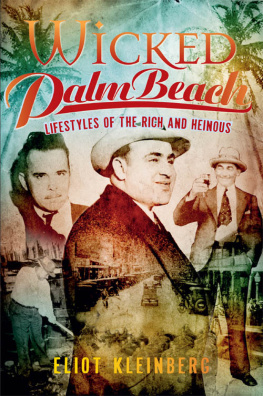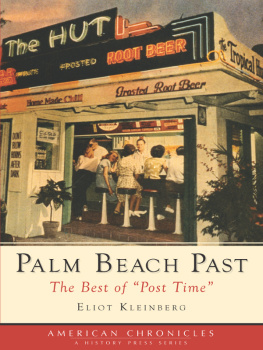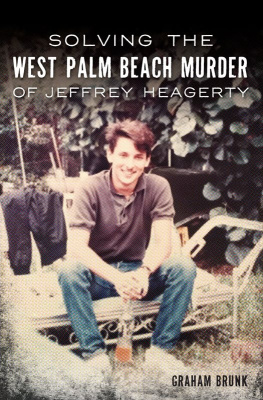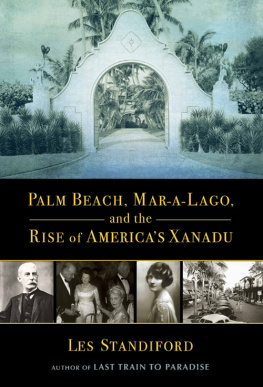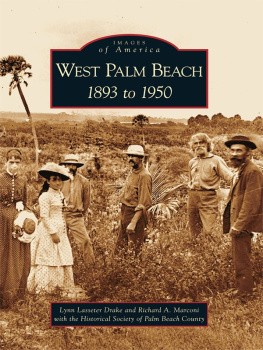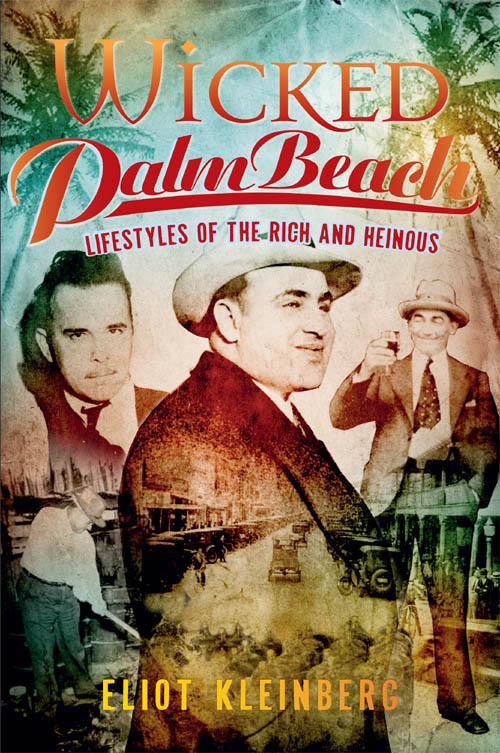

E L I O T K L E I N B E R G

Published by The History Press
Charleston, SC 29403
www.historypress.net
Copyright 2009 by Eliot Kleinberg
All rights reserved
First published 2009
e-book edition 2011
Cover design by Marshall Hudson
ISBN 978.1.61423.151.6
Library of Congress Cataloging-in-Publication Data
Kleinberg, Eliot.
Wicked Palm Beach: lifestyles of the rich and heinous / Eliot Kleinberg.
p. cm.
print edition ISBN 978-1-59629-794-4
1. Palm Beach (Fla.)--History--20th century--Anecdotes. 2. Palm Beach (Fla.)--Social life and customs--Anecdotes. 3. Palm Beach (Fla.)--Biography--Anecdotes. I. Title.
F319.P2K55 2009
975.932063--dc22
2009026266
Notice: The information in this book is true and complete to the best of our knowledge. It is offered without guarantee on the part of the author or The History Press. The author and The History Press disclaim all liability in connection with the use of this book.
All rights reserved. No part of this book may be reproduced or transmitted in any form whatsoever without prior written permission from the publisher except in the case of brief quotations embodied in critical articles and reviews.
Except where noted, all of the material in this book was originally published in the Palm Beach Post and is reprinted here with permission.
Contents
Introduction
HYPOCRITES ROW
During Prohibition, the Royal Poinciana Hotel in Palm Beach featured a secret hallway that people could employ to sneak to a private area where they could drink. It was called Hypocrites Row.
Few eras in few places are as exciting, outrageous and tragic as the period between the end of World War I and the hammer fall of the Great Depression, when Florida partied, passed out and woke up with one heck of a hangover.
Enjoy these tales, most of which originally appeared in the Palm Beach Post as full-length features or segments of my Post Time local history column, which marked its 500th segment in August 2009 and was the basis for my first History Press book, Palm Beach Past: The Best of Post Time (2006).
The Depression, of course, didnt shut down the party; it was just on hiatus. It would be a world war, of all things, that restored prosperity to the quiet state at the end of the line and started a population explosion that continues today.
And, of course, the wickedness never ended. Did you really think it would?
Welcome to Wicked Florida!
I
Wicked Tales
The Last Hanging
Whiskey and Bad Women Were the Cause of It
In 1923, the Florida Department of Corrections began conducting all executions by electric chair and centralized them at the state prison in Raiford. Before that time, counties had carried out the penalties themselves.
The last such death in Palm Beach County is believed to have occurred on July 2, 1915, when Shelby Wise was hanged at the county jail on First Street in West Palm Beach.
Wise had stabbed another man in Reno, the neighborhood along the railroad tracks near Banyan Street that held some of the citys most notorious whiskey dens and brothels.
Claude Brown, who ran a packinghouse in Boca Raton with his brother, had come to West Palm Beach on Saturday night, April 12, 1914.
Sometime early Sunday, Brown was at a prostitutes home, arguing over money and drinking. Witnesses said that Brown struck Wise, who lived with the prostitute, in the face with a bottle. The two scuffled, and Wise stabbed Brown four times.
A railroad worker found Brown near death along the track. Someone said that Wise had left town, heading north. Two deputies gave chase. About six hours later, they found Wise eight miles north of town.
At the trial, prosecutors argued that the time between Brown striking Wise and Wise chasing him made the murder premeditated and worthy of the death penalty.
Race was a far more visible issue in South Florida in 1914. Brown was white; his killer and the prostitute were black. Wises defense attorney asked the jury not to be influenced by race. He said that Brown was the aggressor and asked that Wise be convicted only of manslaughter.
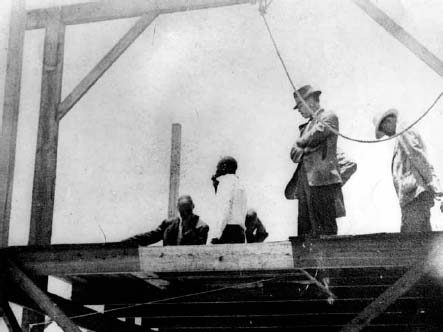
Shelby Wise, believed to be the last man executed in Palm Beach County before the state centralized executions, smokes his last cigarette before his hanging, held on July 2, 1915, at the Palm Beach County Jail on First Street in West Palm Beach. Standing on the scaffold (order not known) are Palm Beach Sheriffs Office captain George Baker, Deputy George Baker Jr., Deputy Bob Baker and Deputy A.P. Gore. Historical Society of Palm Beach County.
On June 26, 1914, after deliberating for two and a half hours, a jury found Wise guilty of first-degree murder.
Hopeless, no possible chance for life, the prisoner sat with downcast eyes, read a June 26, 1914 story in the Tropical Sun, a predecessor to the Palm Beach Post. From not one face left in the courtroom did he read a sign of mercy, showing plainly that for him, death had already begun.
Wise spent his time in jail singing gospel songs and preaching to fellow inmates and even the press. My soul is right with my maker, and I am ready to die, he told reporters.
Whiskey and bad women were the cause of it, Wise said of Browns murder. Indeed, I am sorry. But then, it is all over. And I am not worrying about it anymore.
At the county jail, on First Street in downtown West Palm Beach, work on the scaffold began. Governor Park Trammell delayed the hanging by two weeks to let Wises lawyers appeal for a lesser sentence. But the states pardoning board turned Wise down. When he was told of his fate, Wise smiled and said, All right.
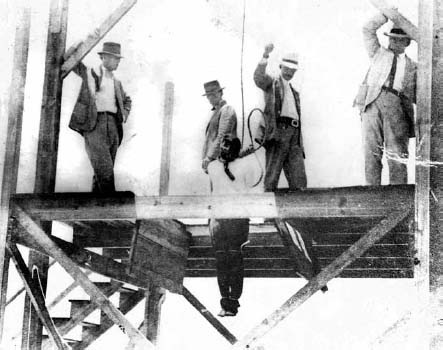
Shelby Wise after his hanging. Historical Society of Palm Beach County.
On the morning of July 2, Shelby Wise smoked a cigarette on the scaffold and then stood as deputies placed a black hood over his head. The lever was pulled, and he fell through the trapdoor.
Originally published in the Palm Beach Post, December 21 and 28, 2005.
The Death of Martin Tabert
He Saw the Bad Part
Florida has a long history of labor exploitation, predating the Civil War. Early in the twentieth century, ugly hearings and a sensational trial drew national coverage to rural North Florida, aiming scrutiny on the states brutal convict-leasing system.
Its martyr was Martin Tabert, who was busted for vagrancy in 1922 and turned over to a work camp, where a whipping boss beat him to death.
Clifford Tabert, who was eighty-seven in 2004, said at the time that he didnt remember much about his uncle. But he clearly recalled another man who came by his North Dakota family home about 1932; Clifford was then about fifteen.

